SOMETIMES I GET ASKED STUFF… PART 21
 WOW. Hard to believe this is the 21st installment of this Q and A column. I admit, I did not expect it to make it this far, but I'm so excited that it has. Thank you to everyone who sends in their questions. They are appreciated. Please, keep them coming.
WOW. Hard to believe this is the 21st installment of this Q and A column. I admit, I did not expect it to make it this far, but I'm so excited that it has. Thank you to everyone who sends in their questions. They are appreciated. Please, keep them coming.And now, one with the show...
One of the perks of being a writer is getting to meet some of the most interesting people. Whether it is at conventions, store signings, through the Earth Station One podcast, writer’s groups, on social media, and sometimes just from people I run into on when I venture out of the cave I call my office, and they have questions. Sometimes they are about writing or what I’m working on. Other times they’re out of left field. I thought it would be interesting to share some of them along with a few answers. Regardless of where they come from, here’s a few of the latest.
You can check out all of the past installments of Sometimes I Get Asked Stuff... here.
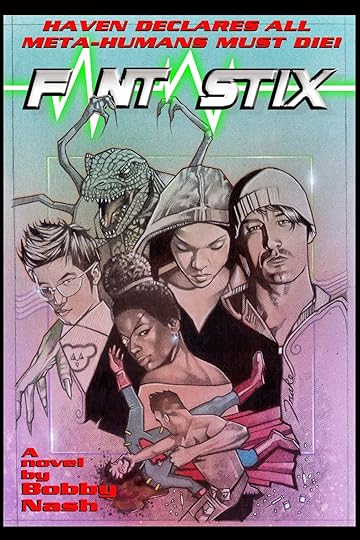 Q: What is the longest time it ever took you to write a story/book? And what is the shortest time it ever took you to write a story/book?
Q: What is the longest time it ever took you to write a story/book? And what is the shortest time it ever took you to write a story/book?The shortest turnaround on a novel was 3 months. That was on a novel called Fantastix: Code Red that is sadly out of print at the moment and I doubt will ever be available again. That's polished and ready to go to press. It was not easy and I didn’t enjoy the experience, but I did it (I was also working a fulltime day job at the time as well). The longest is as yet undetermined. I have a novel that I started on about 10 years ago, but I keep setting it aside for other projects. I’ll get back to it eventually.
 Q: Tell us about the very first main character you ever created!
Q: Tell us about the very first main character you ever created!When I was a kid I created a slew of comic book characters. I don’t recall the order, but one that stuck with me was a character I called “Nightglider” who was a former stuntman turned p.i. who had the ability to hover due to an accident (long story). He could hover, but not fly on his own. He needed propulsion, which added an interesting bit to the character. A Nightglider comic strip was published in a local kid’s magazine. Later, I ditched the costume and code name, but kept the hovering and p.i. parts. It’s been a long time since I’ve used the character though.
There are other characters still rattling around in my brain too. Nathanial “Doc” Frontier, which came out last year.
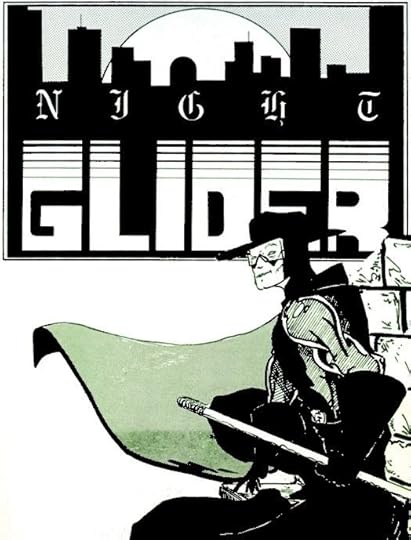 Dresden is another that I want to revisit. I reprinted some of his older stories in
Dresden is another that I want to revisit. I reprinted some of his older stories in Q: How important is the setting of your story?
Very. Unless you need your locations to remain generic and/or unknown, setting is very important. Setting is the stage that the characters are playing on in your story. You can take a scene set in an office building and move it to a beach house, but because of setting, the scene will play out differently. When I write stories that take place in Sommersville, a fictional town I created for use in Evil Ways, Deadly Games, the upcoming Evil Intent, and eventually in the Sheriff Myers stand-alone stories, the town really becomes another character. Sommersville has a feel that is different from Washington DC or New York, or even Atlanta. That feel is important for stories taking place in that location.
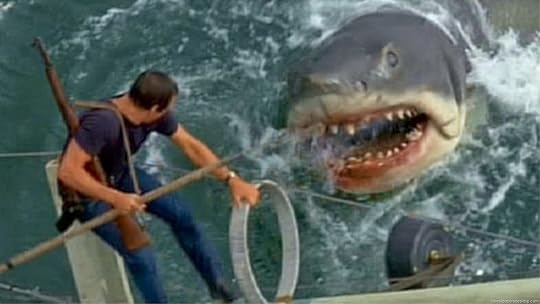 Q: Favorite movie quote?
Q: Favorite movie quote?Smile you sonuva--BOOM!
I’ve always liked that line from JAWS.
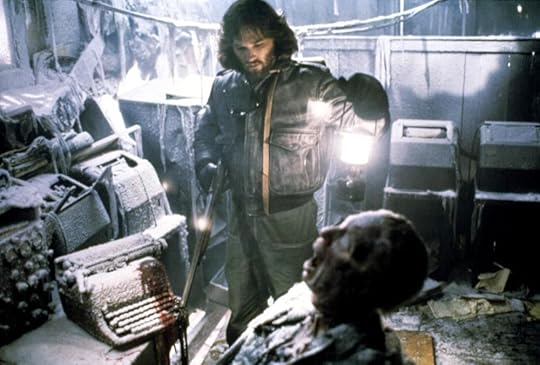 Q: In an era of constant movie remakes, some needed and some not, what movie would you like to see remade and by what director?
Q: In an era of constant movie remakes, some needed and some not, what movie would you like to see remade and by what director?I’m not a fan of remakes in general. Sure, sometimes you get a great one like John Carpenter’s The Thing, but usually you end up with something not as good as the original. If I had to choose something, I think Airwolf would be a good remake vehicle (pun intended).
 Q: How do you cope when exhaustion nips at your heels?
Q: How do you cope when exhaustion nips at your heels?Caffeine helps. I’ve joked before that Mt. Dew is often my co-writer. Sleep is good too, although sometimes that’s not a viable option.
Q: What comes fastest to you unbidden: characters, scenes or the spine of a story?
It varies from story to story. Most of the time it’s scenes that just hit me, but there are times it’s the characters or the complete story in one shot, but that last one is rare for me.
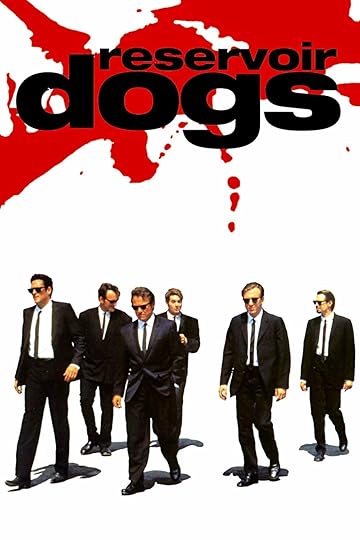 Q: Your Favorite Tim Roth Movie?
Q: Your Favorite Tim Roth Movie?Reservoir Dogs.
Q: Your Favorite Tom Hanks Movie?
So many to choose from, but I'll go with Saving Private Ryan or Forrest Gump.
Q: How effective is going to conventions in selling books? Do you get a table for the day?
 Conventions are definitely a good way to get your books out there in front of potential readers. Sometimes you sell well, other times not so much. I look at conventions as part of my marketing plan. Selling books is nice, and always appreciated, but I try not to let it bother me when I don’t.
Conventions are definitely a good way to get your books out there in front of potential readers. Sometimes you sell well, other times not so much. I look at conventions as part of my marketing plan. Selling books is nice, and always appreciated, but I try not to let it bother me when I don’t.The trick is finding the right convention to approach that fits the type of book you’re selling/promoting. An adult-oriented con might not be your best fit for books geared toward a younger crowd, for example. The
 same might be true for a comic convention as well (although, your mileage may vary there). There are library shows and book festivals where kid's books seem to do better than at conventions, which usually skew more adult. Then again, there are some cons that reach out to kids. You just have to research the cons you're interested in attending.
same might be true for a comic convention as well (although, your mileage may vary there). There are library shows and book festivals where kid's books seem to do better than at conventions, which usually skew more adult. Then again, there are some cons that reach out to kids. You just have to research the cons you're interested in attending.The table situation also varies from con to con. Some conventions charge a small fee for the table, anywhere from $35 - $100 for the weekend. Other, larger shows, a table can cost $300 - $500 easily. You have to decide how much you’re willing to spend and whether or not that works for you. There are some cons that will offer their guests a free table. It just depends on the convention.
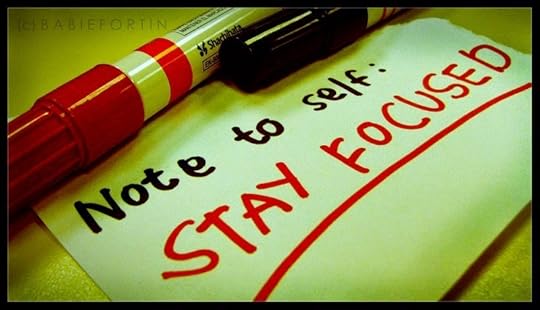 If you're interested in testing the waters, I would recommend trying a small, local con to start. There are some one day shows that might be a good place to try setting up and see how it goes.
If you're interested in testing the waters, I would recommend trying a small, local con to start. There are some one day shows that might be a good place to try setting up and see how it goes.Q: I have a question about writing as a profession, if you don't mind. I am an aspiring author and am working at writing my first project. So here's my question: before you have a publication
 deadline, how do you stay motivated to work every day for a set amount of time? I have several other responsibilities like everyone lol and my biggest problem with the writing right now is just committing time to it.
deadline, how do you stay motivated to work every day for a set amount of time? I have several other responsibilities like everyone lol and my biggest problem with the writing right now is just committing time to it.Deadlines are a marvelous thing. Even if you don't have a deadline from a publisher, set your own, but also, set reasonable deadlines. You know how much time you have to devote to writing each day. Make your writing time part of your daily schedule. Once the people in your life know that 5 - 5:30 pm (for example) is writing time, they will learn to leave you alone (maybe, hopefully, if you're lucky) during that time. You might
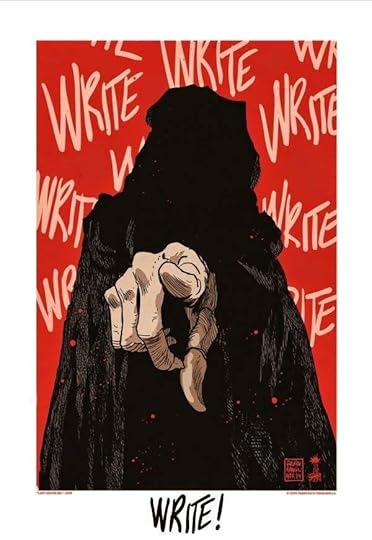 have to remind them a few dozen times.
have to remind them a few dozen times.If your goal is to write as a career, then it's never too early to treat it like a job. That way, when it becomes a job, you're already ahead of the game.
As for motivation, that's obviously different for everyone. For me, I am motivated because I have new story ideas come to me all the time. I can't start on my cool new idea until I finish the project already in process. That helps me stay focused.
Q: How much should character and world interrelate in pulps? What's more important, building the world or creating the character?
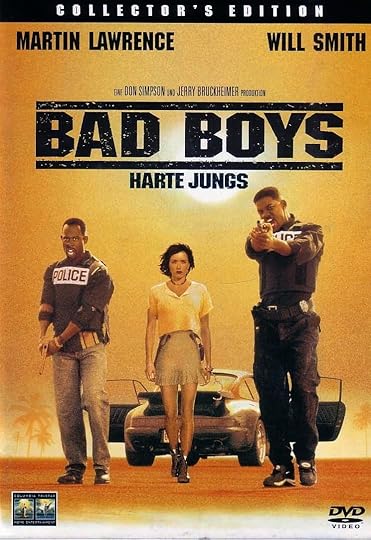 As with all stories, I think character and world are important. Just like in real life, people act and react differently in various locales. Take a person who lives in a bustling metropolis and let them spend a week in the country, or vice versa, and you can see changes in how the person acts. Same with characters. I actually played with this concept in “Lone Justice” the story
As with all stories, I think character and world are important. Just like in real life, people act and react differently in various locales. Take a person who lives in a bustling metropolis and let them spend a week in the country, or vice versa, and you can see changes in how the person acts. Same with characters. I actually played with this concept in “Lone Justice” the storyQ: Your favorite Will Smith movie?
I really enjoy the first Bad Boys.
Q: Do you recall a book that piqued your interest as a child that you just had
 to have?
to have?Captain America #286. Saw this and knew I had to read it.
Q: What was the first movie you remember seeing in the theaters?
My parents have never been "go to the movie" people so I can count the number of times they took me to movies on one hand. The first I remember was catching a double feature at the drive in. They showed The Jungle Book first and then followed it with Star Wars. I was hooked.
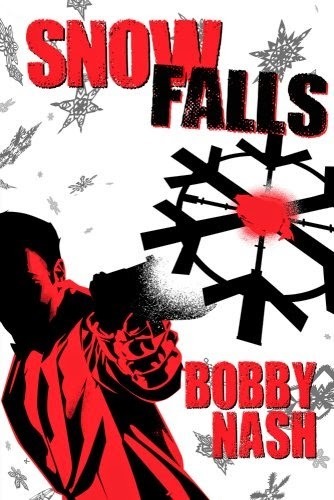 Q: Writing Question of the Day: What is the theme of your story?
Q: Writing Question of the Day: What is the theme of your story?The theme of Snow Falls is starting over.
Q: What inspirational thing is on your agenda for the weekend?
I’ll be set up a convention this weekend. I always come away from a convention appearance energized with new creative energy and ready to work. It’s definitely an inspiration.
Q: Did'ja ever write a cozy mystery?
 Cozy-ish maybe. No matter how much I plan to tone it down, the violence (and sometimes murder) creeps into my stories, which slides them away from cozy territory. I do have plans for Sheriff Tom Myers (who appeared in Evil Ways and Deadly Games!) to have standalone stories that would not necessarily revolve around murder and would better fit the cozy mold. I just have to make room in the schedule to write the darn things. HA! HA! HA!
Cozy-ish maybe. No matter how much I plan to tone it down, the violence (and sometimes murder) creeps into my stories, which slides them away from cozy territory. I do have plans for Sheriff Tom Myers (who appeared in Evil Ways and Deadly Games!) to have standalone stories that would not necessarily revolve around murder and would better fit the cozy mold. I just have to make room in the schedule to write the darn things. HA! HA! HA!Q: What are the most important things to keep in mind when designing a successful book cover of a successful comic book cover?
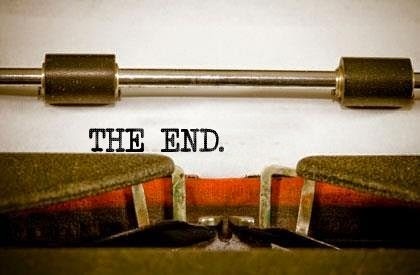 Like any cover, it has to be eye-catching. It also has to be easily readable at thumbnail size, or from across the room, which is my acid test. If I have trouble reading the title or making out what’s on the cover from a few feet away then it doesn’t work for me.
Like any cover, it has to be eye-catching. It also has to be easily readable at thumbnail size, or from across the room, which is my acid test. If I have trouble reading the title or making out what’s on the cover from a few feet away then it doesn’t work for me.Q: When is it really The End? Are you one of those writers who tends to never be sure if the novel, short story, poem, or screenplay has actually come to The End?
 I usually know. The trick is not to keep going back to tinker with the earlier parts of the story once I’m done. I do a lot of work for hire that comes with set word limits so I’ve learned how to craft stories to fit the word count I have to reach. It’s a skill that came with lots of practice though.
I usually know. The trick is not to keep going back to tinker with the earlier parts of the story once I’m done. I do a lot of work for hire that comes with set word limits so I’ve learned how to craft stories to fit the word count I have to reach. It’s a skill that came with lots of practice though.Q: What is your writing pace this year? What goal posts do you set: word count, chapters, some other marker?
 I’m at warp speed this year. I’ve taken on several work for hire projects this year so my deadlines are pretty tight, which keeps me focused and working. So, for me, my goals are reaching those deadlines.
I’m at warp speed this year. I’ve taken on several work for hire projects this year so my deadlines are pretty tight, which keeps me focused and working. So, for me, my goals are reaching those deadlines.Q: Were you ever in the military?
Nope. I have never served in the military. My Dad served in Vietnam so I've heard a few stories of his over the years. In fact one of them ended up in my Fightcard: Barefoot Bones novel. My grandfather served in WWII, but he never spoke of the experience.
 Q: You write about the law departments quite a bit. Cops in your family or diligent research?
Q: You write about the law departments quite a bit. Cops in your family or diligent research?Diligent research. No law enforcement in my family at all. As part of my research, I have met local cops, FBI Agents, GBI Agents, Secret Service Agents, crime scene techs, and others. They do incredible work and I like to write crime fiction so it was good to get out there and meet them. I want to write them properly. I've also met a criminal or two in my day so there's that too.
 Q: Do you think that certain genre novels written by experts in those areas seem to portray more realistic stories than your everyday fiction writer?
Q: Do you think that certain genre novels written by experts in those areas seem to portray more realistic stories than your everyday fiction writer?Knowing the details certainly helps when it comes to writing stories. It adds a level of detail and realism that might not come from a person who is not an expert. Of course, that expert still has to be able to write the fiction side as well. There’s a reason the advice of “write what you know” is often given.
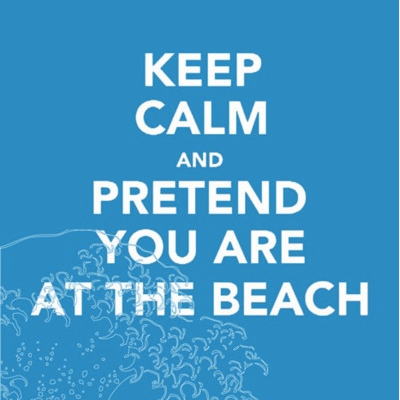 My vacation plan. :)And I think that is a good place to finish this round of
Sometimes I Get Asked Stuff…
Do you have any questions you’d like me to answer? Post them here as a comment or send them along to bobby@bobbynash.com and I’ll answer them in a future installment of
Sometimes I Get Asked Stuff...
My vacation plan. :)And I think that is a good place to finish this round of
Sometimes I Get Asked Stuff…
Do you have any questions you’d like me to answer? Post them here as a comment or send them along to bobby@bobbynash.com and I’ll answer them in a future installment of
Sometimes I Get Asked Stuff...
Also, please sign up for my mailing list. Drop me an email at bobby@bobbynash.com and I'll happily add you to the list.
If you’d like to check out my work, you can find my books at Amazon, Barnes and Noble, Goodreads, Smashwords, and more.
Let’s do this again soon.
Happy Reading.
Bobby
Published on May 20, 2014 19:46
No comments have been added yet.



